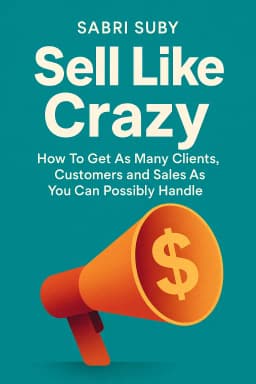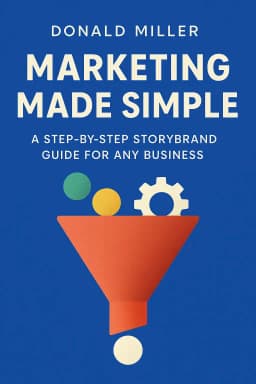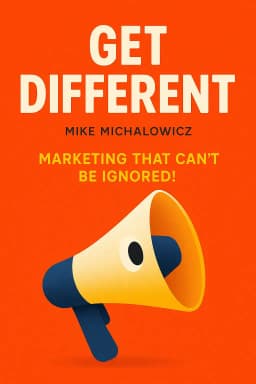
The Sales Lab Coat
Proving Strategies to Make Your Pitch, Influence Decisions, and Close the Deal
Golden Hook & Introduction
SECTION
Olivia: Jackson, when I say the word 'salesperson,' what's the first image that pops into your head? Jackson: Oh, easy. A guy in a slightly-too-shiny suit, smelling faintly of desperation and cheap cologne, whose favorite phrase is 'What's it gonna take to get you into this car today?' Olivia: Exactly! That stereotype is precisely what our book today aims to dismantle. We're diving into The Science of Selling by David Hoffeld. And Hoffeld is not your typical sales guru. He's a researcher, has lectured at Harvard Business School, and he basically got fed up with the exact stereotype you just described. Jackson: So he's trying to put some science behind the shiny suit? Olivia: He's trying to get rid of the shiny suit altogether and replace it with a lab coat. He argues that most sales training, and by extension, most of what we think about persuasion, is based on anecdotes, not evidence. And that's why it so often fails. Jackson: I can see that. Everyone has their one trick that they swear by, but it never seems to work for anyone else. Olivia: That's the heart of the problem. The book opens by highlighting that the entire sales profession is in turmoil. Traditional techniques just aren't cutting it anymore, especially now that buyers can research everything online before they even talk to a salesperson. Jackson: Right, the power has shifted. You can’t just dazzle someone with features when they have twenty browser tabs open comparing you to your competitors. Olivia: Precisely. And Hoffeld argues the problem runs deeper. The very foundation of how we teach selling is flawed. It’s all built on a mountain of personal stories.
The Crisis of Anecdotal Selling
SECTION
Jackson: What do you mean by 'personal stories'? Like, war stories from the top salesperson of the month? Olivia: Exactly that. The book tells this fantastic story to illustrate the point. Hoffeld is in a meeting with an old colleague, a guy named Bill. Both are highly successful, top-tier sales professionals, and they're designing a new training program. Jackson: Okay, so two experts in a room. Sounds productive. Olivia: You'd think so. They start discussing how to build rapport with a potential customer. Hoffeld suggests a specific strategy that he's used and has trained others to use with great success. But Bill immediately shuts it down. He says, "No, that doesn't work. I tried it, my team tried it, and the results were dismal." Jackson: Uh oh. The battle of the anecdotes. Olivia: It's a perfect storm. Hoffeld fires back with his own proof: "But I have a dozen examples of it working!" Bill counters with his own list of failures. They go back and forth, getting more and more frustrated, because both of them are right, based on their own isolated experiences. Jackson: That's wild. It’s like two master chefs arguing over a recipe, but neither one uses measurements. One says 'a pinch of salt' and the other says 'a handful,' and they're both convinced they're making the same dish. Olivia: That is the perfect analogy. And that’s when Hoffeld has this epiphany. He realizes their entire debate is pointless. Both of their methods, their entire careers of expertise, were built on sand. They weren't based on factual, provable evidence that could work consistently for anyone. It was all just... stories. Jackson: Wow. That must have been a humbling moment for a top performer. To realize your secret sauce might just be snake oil. Olivia: Completely. And he argues this is the state of the entire industry. Sales methodologies are passed down like folklore. "This worked for me, so it must be the truth." The book points out that this leads to wildly unpredictable results and a huge failure rate in the profession. Jackson: So what's the real damage of this approach? Are companies just wasting billions on training that's basically professional gossip? Olivia: That's a huge part of it. But it also creates a culture where success is seen as this magical, innate talent. You're either a 'natural' salesperson or you're not. Hoffeld says that’s nonsense. Persuasion, he argues, isn't an art. It's a science. And once you understand the scientific principles, anyone can learn to do it effectively. Jackson: That’s a bold claim. It takes selling out of the realm of charisma and personality and puts it into the realm of… process. Olivia: Exactly. He says influence is the foundation of everything. He quotes a neuroscientist who says, "A person can have the greatest idea in the world—completely different and novel—but if that person can’t convince enough other people, it doesn’t matter." That applies to entrepreneurs, job seekers, parents, anyone. Selling is just a formalized version of influence. Jackson: Okay, I'm sold. The old way is a mess of conflicting stories and unreliable advice. It's a system built on luck and personality. So what's the alternative? What does the 'lab coat' approach actually look like?
The Power of Neuroselling
SECTION
Olivia: This is where the book really shifts gears. After that debate with Bill, Hoffeld essentially threw out everything he thought he knew about selling and started over. He spent nearly a decade diving into research from completely different fields. Jackson: Like what? Business journals? Olivia: Far beyond that. He went into social psychology, neuroscience, cognitive psychology, behavioral economics—all these disciplines that study how the human brain actually works. How it processes information, forms beliefs, and ultimately, makes decisions. Jackson: So he wasn't looking for new sales tricks. He was looking for the brain's user manual. Olivia: That’s a great way to put it. The core idea of the book is that you should sell the way people buy. And science gives us the blueprint for how people buy. The goal is to align your sales activities with the brain's natural, hardwired decision-making processes. Jackson: It’s like instead of trying to pick the lock, you're just finding the right key. Olivia: The perfect metaphor. You don't have to force anything. When your approach aligns with how the brain is designed to receive a message, the buyer becomes more receptive, and the whole process feels more natural and less adversarial for everyone. He tested these new, science-backed strategies himself. Jackson: And how did that go? Olivia: The results were staggering. He became the number-one performing salesperson in his company. Then he trained the entire sales force. Their closing rates increased by 92 percent. The company's overall sales revenue grew by 156 percent. Jackson: Whoa. Okay, those are not anecdotal numbers. That's hard data. Olivia: It's verifiable proof of concept. He then launched his own consulting firm, and the book cites more examples: one client increased their average sale size by 34 percent, another grew their sales by over 230 percent. Another company cut their customer churn almost in half. The evidence is overwhelming that this approach works. Jackson: This sounds great in theory, but it's still a bit abstract for me. Give me one concrete principle. How does this actually work in a real conversation? Olivia: Okay, a great example from the book's later chapters is the concept of the "likability bias." Decades of research show, unequivocally, that we are more influenced by people we like. It’s a simple, universal human truth. Jackson: Sure, that makes sense. I'd rather buy from a friend than a stranger. Olivia: Right. But traditional sales training turns this into a clumsy tactic. "Find something in their office you have in common! Oh, you have a golf trophy? I love golf!" It comes across as fake and transactional because it is fake and transactional. Jackson: I can feel the cringe just thinking about it. Olivia: The scientific approach is different. It asks, what actually creates genuine likability? Research points to things like demonstrating authentic empathy, active listening, and finding sincere common ground. It's not about faking an interest in golf; it's about being genuinely curious about the other person's problems and showing that you care. The science validates that being a good, decent human is also good business. Jackson: That’s a much better frame. It’s not a trick; it’s a reminder to tap into something fundamentally human. The science just proves that our instincts about genuine connection are correct. Olivia: Exactly. The book is filled with principles like that—anchoring, social proof, the picture superiority effect—all grounded in solid research. Each one is a tool to communicate more effectively by working with the brain's programming, not against it.
The 'Manipulation' Debate
SECTION
Jackson: Hold on. As you're talking, a little alarm bell is going off in my head. I was looking at some reader reviews for this book, and while most are glowing, there's a vocal group that finds this whole approach... well, a bit creepy. Olivia: Ah, yes. The manipulation question. Jackson: They call it manipulative, 'spiritually bankrupt.' One person said it felt like learning 'ploys' to trick people. Are they wrong? Because I can see their point. Learning about cognitive biases to 'influence' someone sounds like you're learning to be a Jedi Master of the dark arts. Olivia: This is probably the most important critique to address, and the book doesn't shy away from it. The author's perspective is that influence itself is neutral. It's a tool, like a hammer. You can use a hammer to build a house or you can use it to break a window. The tool isn't good or evil; the intent of the user is what matters. Jackson: But there's a fine line, right? Between guiding a decision and exploiting a cognitive bias for your own gain? Olivia: There is a very fine line, and the ethical compass is intent. Hoffeld's entire framework is built on the idea that these scientific principles should be used to create value and solve genuine problems for the buyer. The goal is to make your message clearer, more resonant, and more helpful. Jackson: Can you give me an example of that distinction? Olivia: Sure. Let's take the "fear of loss" principle, also known as loss aversion. Research by psychologists like Daniel Kahneman proved that humans are far more motivated to avoid a loss than to achieve an equivalent gain. Losing a hundred dollars feels much worse than finding a hundred dollars feels good. Jackson: Okay, I can relate to that. Olivia: The manipulative, unethical salesperson uses this to invent a problem. "If you don't buy this security system right now, your house will probably be robbed tonight!" They are creating fear to drive a sale. That's exploitation. Jackson: Right, that's the shiny-suit guy again. Olivia: The ethical, science-based approach uses this principle to clarify the real consequences of inaction. "You mentioned that your current system is failing and you're worried about a potential data breach. Let's talk about the real costs of a breach—not just financial, but to your company's reputation. By addressing this now, we can prevent that potential loss." Jackson: I see the difference. One is manufacturing a threat; the other is highlighting a risk the customer has already identified. It's a shift from pressure to perspective. Olivia: Precisely. The book argues that the most successful salespeople are the ones who act as trusted advisors. They guide buyers through the complex mental journey of making a good decision. Science just provides a more accurate map for that journey. It helps you understand the buyer's emotional state, their underlying motivations, and the questions their brain needs answered before it can commit. Jackson: So the argument is that ignoring the science is actually a disservice to the customer? You're just stumbling around in the dark, relying on your own anecdotes, and hoping you accidentally say the right thing. Olivia: That's the core of it. By understanding the science, you can be more deliberate, more empathetic, and ultimately, more helpful. You're not just throwing spaghetti at the wall to see what sticks; you're co-creating a solution.
Synthesis & Takeaways
SECTION
Olivia: When you pull it all together, the book makes a powerful case that the future of selling—and persuasion in general—is about moving from supposition to science. It's about replacing folklore with facts. Jackson: It feels like a call for more professionalism, in a way. To treat influence with the same rigor a doctor treats medicine or an engineer treats a bridge. You need to understand the underlying principles. Olivia: I think that's right. And the most profound insight for me is that this approach doesn't dehumanize the process. It actually does the opposite. The science consistently points back to fundamental human truths: people want to be heard, they want to connect with people they trust, and they want to feel confident in their decisions. Jackson: The science just gives you a better toolkit to facilitate that. It’s not about turning people into puppets; it’s about becoming a better listener and a clearer communicator. Olivia: Ultimately, the book argues that the most ethical and effective way to sell is to deeply understand the person in front of you. Science just gives us a more reliable map to that understanding than guesswork. Jackson: It leaves you with a big question, and it applies to everyone, not just salespeople. In any part of your life where you need to be persuasive—at work, with your kids, in your community—are you relying on your own 'anecdotes,' or are you truly trying to understand how the other person's mind works? Olivia: A question to ponder. This is Aibrary, signing off.









